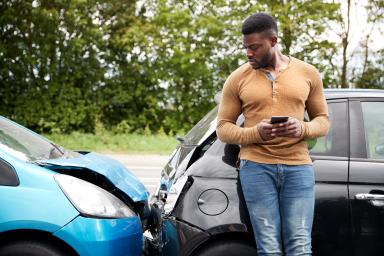North Carolina Car Accident Laws

Car accidents are a major concern in North Carolina, which is ranked among the top 10 states with the most car accident cases in 2022. Its accident fatality rate is 6% higher than the national average, and one in 10 drivers has caused an at-fault accident.
According to the North Carolina Department of Transportation's 2021 report, the state’s recorded auto accidents increased by 11.7% from the previous year, with a 7.5% and 8.9% rise in fatalities and injuries, respectively. Additionally, 23.9% of the logged cases were caused by speeding. In line with this, the Governor’s Highway Safety Program has been running a yearly campaign called Speed a Little. Lose a Lot. since 2017 to educate the public about the serious effects of speeding and reduce instances of related accidents.
If you have been involved in a car crash, whether due to speeding or another cause, it is in your best interest to know the state’s auto accident laws to protect your rights and obtain the compensation you are entitled to. Knowledge of general traffic laws and the responsibilities of car owners is also important for the general public, especially those dealing with traffic and motor vehicles every day.
General Rules of the Road in North Carolina
The rules of the road in North Carolina have been established for consistency in guidelines and improved road safety. The statutes that apply to the state’s thoroughfares include the following:
Speed Limits
The speed limit in North Carolina within incorporated municipalities is 35 mph unless otherwise stated. Roads outside its cities usually have a speed limit of 55 mph, but some towns post lower limits. There are also specific rules for work zones, school zones, and locations with poor visibility. If you have been found to break this law, you may face fines, points on your license, and the possibility of license suspension or revocation.
Lane Usage Restrictions
Drivers are required to keep right on highways except in particular cases, such as when turning left or passing another vehicle. Motorists in the state should also drive within a single lane and only change lanes if done with caution and proper signaling. The consequences of violating this law include receiving penalties up to $200 and/or 120 days in jail, as well as two points on one’s driving record.
Traffic Sign and Signal Rules
The state’s regulations related to traffic signs and signals include the following:
One should obey traffic control signs and signals, which means yielding when the traffic light is red at an intersection, proceeding with caution while continuing to yield to oncoming vehicles when it is yellow, and proceeding with care when it is green.
One should pull over to the right to clear the intersections when emergency service vehicles are approaching.
Violating these rules can result in fines ranging from $25 to $500 plus court fees, depending on the seriousness of the infraction.
Pedestrian Safety Laws
Drivers are mandated to yield to pedestrians in crosswalks, avoid passing vehicles stopped at crosswalks, and exercise due care when approaching pedestrians with disabilities. The penalties for violating these include fines of $1,000 and/or 60 days of jail time. If a driver’s negligence causes an accident, he or she faces civil liability for damages incurred by the victim.
Likewise, pedestrians must obey traffic signals and cross only at the designated spots. If a marked crosswalk is not present, pedestrians must yield the right of way to oncoming traffic.
North Carolina’s Move Over Law
This law was designed to safeguard community workers — such as law enforcement personnel, emergency responders, and utility workers—who work on or alongside the highway. Drivers are required to shift over one lane or slow down whenever they drive in the same direction as an emergency vehicle, whether on the shoulder of the road or right next to it. The same rule applies to utility and road maintenance vehicles.
If you violate the state's "Move Over" law, you may have to pay a fine and get points on your driver’s license. Additionally, you may risk an increase in your insurance rates.
North Carolina’s Vehicle Inspection and Safety Laws
North Carolina encourages environmental consciousness and safe driving behaviors on its roadways. With a few exceptions, every vehicle should go through a regular safety inspection. Annual safety inspections can detect issues related to various car parts and functions, including brake systems, tires, and lighting and signaling.
In North Carolina, if you operate a vehicle without a valid safety inspection certification, you may have to pay a minimum fine of $50. Meanwhile, repeat offenses during a three-year period face a maximum fine of $250.
Vehicle emission testing is also required by state law. Misrepresenting a car’s country of origin to evade emission testing warrants a $250 fine. Additionally, tampering with a vehicle’s emission control system is a crime and is often punishable by fines up to $250, with probable criminal charges.
Laws on Impaired Driving in North Carolina
This set of rules aims to discourage people from operating a vehicle while intoxicated and promote safe driving habits to reduce collisions and fatalities.
Driving While Impaired (DWI)
Driving while impaired by alcohol or drugs is prohibited in the state. One should not drive with a blood alcohol concentration (BAC) of 0.08% or higher. Additionally, the BAC of commercial drivers should not be 0.04% or more. Depending on the severity of the conviction, the penalties for breaking this law include fines from $200 to $10,000, 24 hours to several years in jail, license suspension, community service, court-ordered drug rehab, and the installation of an ignition interlock device in the violator’s car.
Implied Consent Law
Under North Carolina's "implied consent" law, anyone driving a car on a highway automatically agrees to a chemical test of their breath, blood, and urine to look for drugs that make them drunk. Refusing to take the test could result in a one- to four-year license suspension. Moreover, refusal can be used as proof of guilt during a trial.
Laura’s Law
In 2011, North Carolina instated House Bill 49 or Laura's Law, which gives additional punishment to individuals guilty of an aggravated level 1 DWI. This conviction results in one to three years in jail and a maximum of $10,000 in fines.
North Carolina’s Hit-and-Run Laws
In North Carolina, drivers involved in a car accident must stop immediately at the scene of the incident or as close to it as possible without hindering traffic. If it results in injuries or damage to property, they must stay and provide their information to the other party involved. Moreover, they must give reasonable assistance and contact emergency services.
You also have the duty to report it right away to the local police and the DMV within 24 hours using the DMV-349 form, especially when there are fatalities, significant injuries, or property damage worth at least $1,000. Failure to comply with the law may result in hit-and-run charges, which include hefty fines, jail time, and the loss of driving privileges.
North Carolina Traffic Laws Related to Minors
In North Carolina, one can obtain a learner’s permit starting at 15 years old. Before getting a license, a minor must complete a DMV-approved driver's education course that includes 30 hours of classroom instruction, six hours of actual driving training, a written and visual test, and a driving test. The applicant must also ask for their parent's or guardian’s consent.
Additionally, you should be at least 16 years old to apply for a provisional license in the state. You must finish a DMV-approved driver's education course, drive with a learner's permit for 12 months, and do 60 hours of supervised driving, with at least 10 hours spent driving at night. You must also pass a road test, have a clean driving record, and have parental consent. Violating this rule may result in delayed licensure, license suspension, fines, and points on your driving record.
Parents are held accountable for their child’s accident-related conduct if they permit them to drive the vehicle. This is known as the purpose doctrine. The parent liability cost is capped at $30,000 for physical injuries or death to one person and $60,000 for two or more people in the same accident. The maximum liability for property damages is $25,000. However, the driver may still be held liable for their actions, regardless of their age.
For drivers under 21, the state has implemented a zero-tolerance policy that makes it unlawful for them to operate a motor vehicle while having any trace of blood alcohol in their system.
North Carolina Minimum Auto Insurance Requirements
Vehicle owners in North Carolina are required to obtain a minimum liability coverage per accident amounting to the following:
$30,000 for bodily injury per person
$60,000 for bodily injury for two or more people
$25,000 for property damage
In the state, auto insurance policies should also include uninsured motorist coverage with the minimum physical and property damage policy limits. If the policy plan is higher than the minimum required by law, then the policyholder must get uninsured and underinsured motorist coverage.
Additional Insurance Plans
Drivers in North Carolina have the option to purchase other premiums in addition to the state-mandated ones. One example is accidental death and dismemberment insurance, which offers payouts in the event of an accident-related death. This policy also covers the loss of limbs and vision.
Proof of Insurance
North Carolina drivers must carry proof of insurance at all times, as stipulated in the Motor Vehicle Act of 1937.
If you have existing coverage but fail to bring your proof of insurance or misplace it, your insurer must submit a certificate of insurance to the DMV. The DMV will then update its records and remove your fines. To verify if the lapse has been resolved, you may contact the agency at 919-715-7000.
Depending on the number of paid lapses over a three-year term, a civil penalty of $50 to $150 may be required if you want to reinstate your lapsed coverage after the revocation period. You must also pay a $50 restoration charge at the time of the vehicle's registration renewal.
Penalties for Non-Compliance
Owners of vehicles registered in North Carolina must maintain financial responsibility for their cars. Non-compliance with the auto insurance statute could lead to penalties, such as the following:
The first offense is a class 1 misdemeanor that carries a fine of $50.
The penalty for a second infraction within three years, which is still a class 1 misdemeanor, is $100.
The third offense within three years carries a $150 fine.
These offenses all carry a potential punishment of one to 45 days in jail or on probation, a 30-day registration suspension, and an extra $50 for registration restoration on top of the fine.
North Carolina Is a Fault- or Tort-Based State for Insurance Claims
Since North Carolina has a fault-based system for insurance claims, the at-fault driver’s insurance company is responsible for covering the damages and injuries of the affected party up to the policy’s limits.
To promote positive driving behavior and encourage motorists to take responsibility for their actions, the North Carolina Department of Insurance implemented the Safe Driver Incentive Plan (SDIP). Insurance companies are required by state law to adhere to the SDIP guidelines.
A safe driver discount is also available on premium plans for drivers with no at-fault accidents or traffic violations in the past three years. Meanwhile, drivers with at-fault accidents or moving offenses are viewed as high-risk and may have their premiums increased.
North Carolina Is a Contributory Negligence State for Car Accident Lawsuits
North Carolina is one of the four states in the US that strictly abides by the contributory negligence rule. This bars plaintiffs from receiving compensation for the damages they have suffered even if they are deemed just 1% at fault for the accident.
Statute of Limitations for Car Accident Injury Claims in North Carolina
In North Carolina, a car accident victim can pursue legal action for up to three years after the incident. The court can dismiss a case if the lawsuit is filed beyond the deadline, which means seeking compensation for harm or property damage will no longer be possible once the window has passed.
However, there are some exceptions to this rule:
Those injured as minors can file a case when they turn 18 until they’re 21.
Those declared legally insane or mentally incapable have three years to file a case after being deemed sane or competent.
If the defendant leaves North Carolina for at least a year, the statute of limitations is paused until they return to the state.
Average Settlement for Car Accident Lawsuits in North Carolina
The specifics of your case will determine how much money you are entitled to in North Carolina. Some of the damages you can obtain include the following:
Compensatory Damages
Compensatory damages refer to the actual losses brought on by an accident. There are economic and non-economic components to these:
Economic damages include the cost of medical care, lost wages, and property damage.
Non-economic damages include emotional distress and the loss of a loved one. The most amount that can be awarded for this is $500,000.
Punitive Damages
In cases where the defendant's actions were intentional, willful, or atrocious, punitive penalties can serve as their punishment or a way to discourage them from repeating their actions. This type of compensation may be granted depending on how horrible the at-fault party’s conduct is.
In North Carolina, the limit set for punitive damages is either $250,000 or three times the amount of compensatory damages. The cap does not apply to drunk driving cases.
Legal Resources for Car Accident Victims in North Carolina
North Carolina Bar Association
This association provides resources and details on various legal topics, including personal injury law. Its website is also equipped with a referral function that can help people find a car accident lawyer in their area. You may reach it through its number, 919-677-0561, or its office at 8000 Weston Parkway, Cary.
North Carolina Department of Transportation (NCDOT)
The agency manages the state’s roads and highways. If you have been in an accident, you can report it and ask for a copy of the crash report by contacting NCDOT on weekdays, from 8 a.m. to 5 p.m., at 1-877-DOT-4YOU (1-877-368-4968).
North Carolina Department of Insurance
This department oversees the state's insurance sector. Its website offers guidance on submitting an insurance claim after an accident and discusses North Carolina's vehicle insurance laws. You may contact its toll-free hotline at 855-408-1212.
North Carolina Courts
The North Carolina Courts System offers information on how to file a lawsuit following a car accident. It also provides resources for representing yourself in court if you cannot afford a lawyer.
Legal Aid of North Carolina
This nonprofit organization provides free legal assistance to low-income individuals who are unable to afford an attorney. Its office is located at 319 Chapanoke Road, Suite 104, Raleigh.
North Carolina Advocates for Justice
This membership organization is composed of lawyers and other legal professionals who promote justice for all. Its website has a database of attorneys focusing on personal injury law and has information about the legal rights and options of car accident victims. You may email the organization at info@ncaj.com or call it at 919-832-1413.
North Carolina Department of Justice
This department’s website contains consumer protection information, such as suggestions for avoiding fraud and scams following an auto accident.
North Carolina State Bar
This organization regulates the state’s legal professions. Its website has a list of the state’s licensed attorneys, as well as information on how to file a complaint against a legal professional.
National Highway Traffic Safety Administration (NHTSA)
This federal agency is in charge of promoting vehicle safety and minimizing collisions on national highways. The NHTSA website discusses matters related to auto safety, including how to prevent accidents and instructions for reporting car-related safety issues.
Expertise.com StaffAuthor
Step into the world of Expertise.com, your go-to hub for credible insights. We don't take accuracy lightly around here. Our squad of expert reviewers, each a maestro in their field, has given the green light to every single article you'll find. From rigorous fact-checking to meticulous evaluations of service providers, we've got it all covered. So feel free to dive in and explore. The information you'll uncover has been stamped with the seal of approval by our top-notch experts.

Louis WapleReviewer
Lou Waple is a Workers Compensation/Personal Injury Attorney located in Charlotte, NC. He has more than 20 years of litigation experience, most of which have been spent advocating for people who have suffered work related injuries. Visit: http://www.waplehouklaw.com/

![Airbag Injuries and Average Settlement Amounts [2023]](https://images.ctfassets.net/k00sbju4hbzq/3BBaoZsvlj0NDySlMekb5V/aae10f65f969b6faf29ccfbee387c4d4/Depositphotos_61460709_XL.jpg?fit=fill&w=384&q=75)
![Average Car Accident Settlements [2023]](https://images.ctfassets.net/k00sbju4hbzq/4BBkDDWAQT0dL8I9OSMFnt/36439fec4b6260a58e0c384f64809566/Depositphotos_335949804_XL.jpg?fit=fill&w=384&q=75)
![Can I File a Lawsuit if the Car Accident Was My Fault? [2023] DUP IMAGE](https://images.ctfassets.net/k00sbju4hbzq/KjM0u9gm0nmPN9Agv7fih/5a7d1f7c763eada5c66e5547e6e487e1/Depositphotos_341258876_XL.jpg?fit=fill&w=384&q=75)
